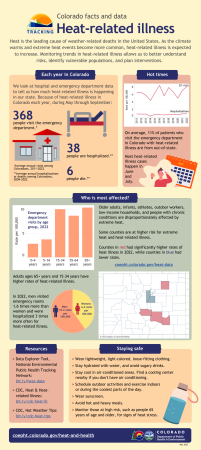
A heat wave can be any period of one or more days when the weather is hotter than usual. In Colorado, that usually means
- Three or more days when the temperature is 90°F or higher.
- Multiple days when the temperature is 10 degrees or more above the average high temperature for the region.
Heat waves are becoming common. Stay cool, hydrated, and informed to prevent heat exhaustion, heat stroke, and other health concerns.
Extreme heat and your health
Stay cool, hydrated, and informed to avoid heat-related illnesses, including heat exhaustion and heat stroke. Heat-related illnesses can damage the brain and other vital organs. These conditions happen when the body’s temperature rises faster than the body can cool itself.
Quick tips
- Stay in an air conditioned area. If your home does not have air conditioning, go to a shopping mall, library or a place that does. Even a few hours in air-conditioning can keep the body cool.
- Drink water often. Don’t wait until you’re thirsty! Avoid sugary drinks and alcohol, which cause a loss of body fluid.
- Provide pets with plenty of fresh water.
- Limit outdoor activity to when it’s coolest. Wear sunscreen of SPF 15 or higher.
- Wear a hat and lightweight, light-colored, loose-fitting clothes.
- Visit adults who are at greater risk at least two times a day. Watch them closely for signs of heat exhaustion or heat stroke.
For more information on how to stay safe in the heat visit the CDC website.
Heat illness infographic
Protecting populations from extreme heat
Extreme heat tools & resources
Tools and resources to prepare for heat events and learn more about the risk of extreme heat.
Colorado resources:
- Colorado Health Institute Health and Climate Index.
- Colorado Resiliency Office Planning for Hazards Extreme Heat.
- Colorado State Hazard Mitigation Plan.
National resources:
- Heat.gov.
- Heat & Health Tracker.
- Climate and Health Outlook.
- Heat Forecast Tools; Experimental HeatRisk Map; and Experimental HeatRisk Overview.
- Climate Change & Extreme Heat – What You Can Do to Prepare.
- Extreme Heat Federal Resources and Data from resilience.climate.gov.
- EPA Prepare for extreme heat.
- Heat Action Platform & Policy Tool.
Tools and resources to consider how the built environment impacts heat exposure in a community and information on implementing cooling centers.
Colorado resources:
A program to build community resilience by developing electricity microgrids.
Free services to income-qualified populations to insulate and improve energy efficiency within homes.
Technical assistance to communities for tree planning, planting, and care.
A guide to green infrastructure best management practices for downtown streets.
National resources:
- EPA Public Health Adaptation Strategies for Climate Change
- Heat Action Platform Heat Adaptation Solutions and Policy Tool
- Planning for Urban Heat Resilience
- Beating the Heat: A Sustainable Cooling Handbook for Cities
- Barriers to using cooling centers
- Americares Toolkit for Health Care Providers, Patients and Administrators
- Heat-Related EMS Activations Dashboard
